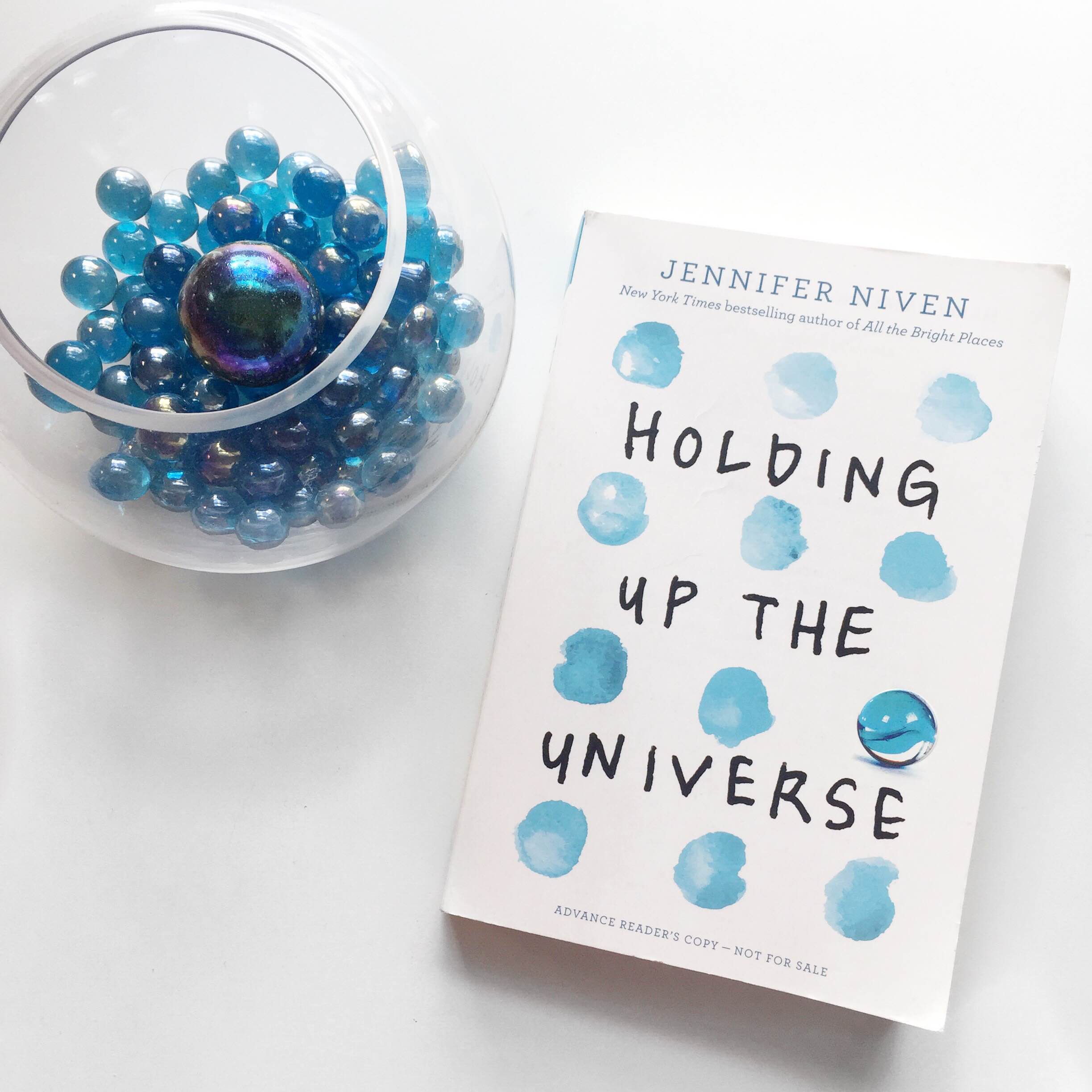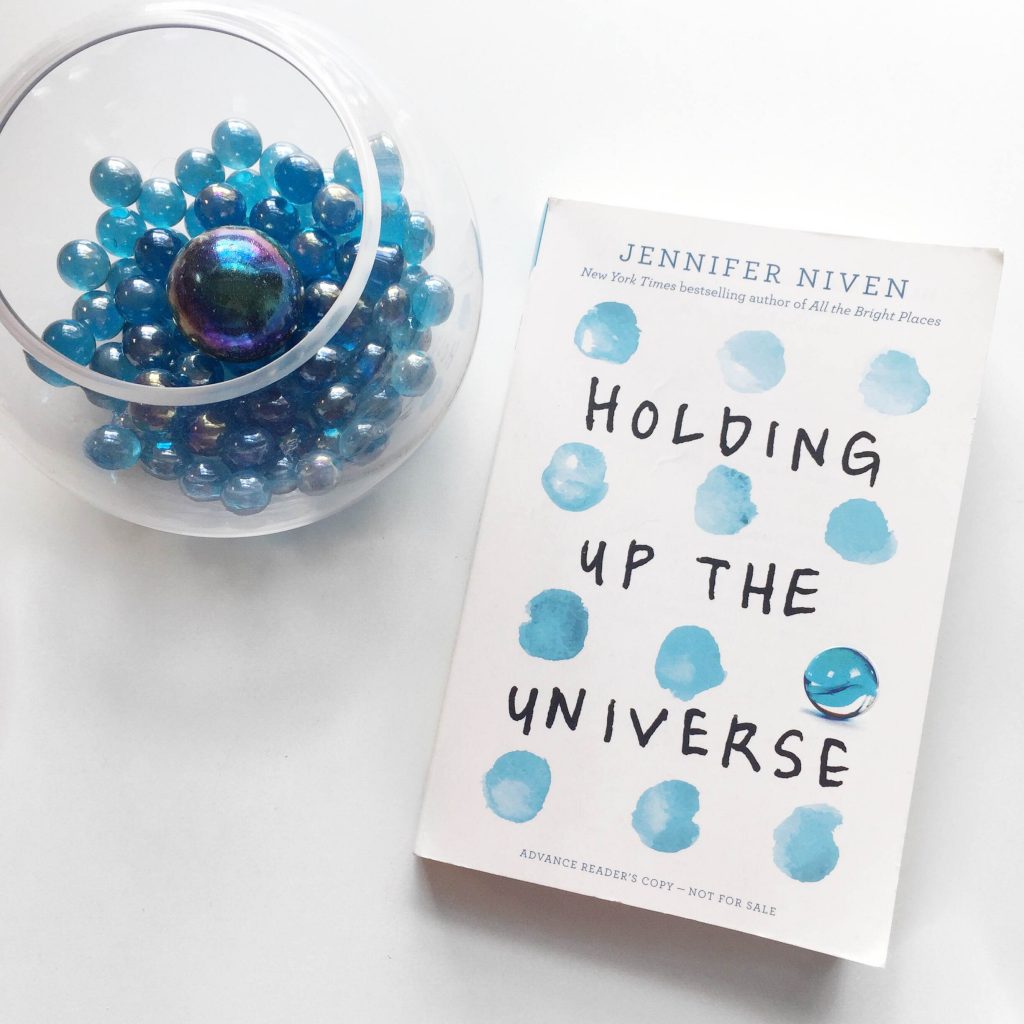Holding Up the Universe, by Jennifer Niven, via Knopf Books, out now.
“Do you ever wonder if it’s everyone else who sees the world differently? Like maybe you see people the way they’re supposed to be seen?”
I have a lot of feelings about Holding Up the Universe. The first time I heard about it was when the news was announced, and the original copy on the Goodreads page was fairly upsetting, in that it read like ‘hey, this is a book about a love story between a girl who was so fat that she had to be lifted out of her house by a crane and a boy who is sick by not being able to recognize faces.’ It was off-putting, because to me, a sensitive somewhat overweight gal, that translated to ‘the only person who could love a fat girl is someone who doesn’t recognize her.’ But because All the Bright Places was my favourite book of 2015, I was reserving judgement until I read this one.
Yes, Holding Up the Universe is about a girl (Libby) who was once so overweight she needed a crane to be taken out of her house. Here’s the context: she gained a lot of weight when her mother passed away, and she lost control of her world. Now she’s lost a lot of weight and is fairly confident, strong, and comfortable, but she’s aware of how those around her aren’t accepting of her body. Yes, Holding Up the Universe is about a boy (Jack) who cannot recognize faces, and he does mainly recognize Libby because of her size, and he does keep his prosopagnosia a secret. He is a genuinely sweet person who needs to learn a lesson or two about being okay with himself and that it’s okay to tell others about his disability. He causes a lot of problems for himself because he won’t talk about what’s happening to him. The two meet in an odd way at school, and end up in a group therapy class together, and eventually fall for each other, with plenty of high school drama in between.
“Listen, I may be keeping the face blindness a secret for now, but that doesn’t mean I want everything in my life to be a secret. It doesn’t mean I want to keep you a secret. I would never hide you away, if that’s what you’re thinking.” As I say it, I ask myself, Is that what I’m doing?
Jennifer Niven wrote Holding Up the Universe as a response to everyone who wrote to her after All the Bright Places, which dealt with severe mental illness. Her individual responses had been ‘You are wanted. You are necessary. You are loved.’ She wrote that a lot of times. So a story blossomed, which took parts from her adolescence when she was struggling with weight and grieving her father, from her recent grieving for her mother, and from her sixteen-year-old cousin who doesn’t recognize faces. She wanted Holding Up the Universe to be like a letter to all the teens who wrote to her, doubting their place in the world, and the messengers for that story took form in Libby and Jack. I do respect that Jennifer did a story that way and is so open about the origins. And I would love to read more about how specifically teens have reacted to the book.
I read the first half of the book very sensitively. I was so nervous about how the characters would come across – mostly how being overweight would be portrayed – that it definitely stuck to how I think about the book. Some things could be a bit triggering, or so upsetting that I’d question if things, like Fat Girl Rodeo – in which a boy runs up to a fat girl and jumps on her and has to hold on for as long as possible – actually exist. If so, that’s so awful. In my teenage years, I don’t recall anything like that ever happening, just mostly people saying hurtful things out loud or online. But I know of others who have reacted differently than me, comforted to see their own struggles rather than thinking the portrayal of a character might be wrong, so that makes me feel good. There is a point in the book where it’s obvious (once you know the author’s motive) how the tone changes, and you’ll spend the rest of the book squeeing at cute moments. By the end of it, I didn’t really have any problems with the situation, although was it necessary to make her so big she had to be lifted out by a crane? I can see how that would be used as an excuse for her being absent from school from so long and for dealing with trauma, but is that not a little extreme?
I did really like Libby and Jack as characters. I loved how Libby portrayed her confidence (even though sometimes it was used as a shield) and that she was up front about her sexuality (fat girls have sex too!). I liked Jack for his voice as I was there to see him learn how to navigate the world around him. I could have done without half of his mentions about prosopagnosia – a lot of times it was like ‘yes, I get that you have that, you don’t have to tell me again,’ especially when it was about his family members. We understand right away that he can’t recognize his family members, and is paranoid that people could play tricks on him, but 99% of the time if you walk into your brother’s room, you know that guy is going to be your brother, right? And there was not one mention about if he could recognize voices, which I figured would be a big sense that would take over, but that’s just my guess.
Overall, I did like the story and the motive behind it, but I did not love it or connect with it as much as I’d hoped, especially after All the Bright Places. I am not a teen that’s looking for that message, so there’s that. And I hold ATBP up in high regard, so it’d be hard to come close anyway. I will remember that I read it with hesitation (which is simply a personal reaction), but I will also remember how well Jennifer writes characters and her romantic writing style. How much I ended up loving Libby. I’m looking forward to what Jennifer comes up with next!
[I received this book from Chapters Indigo in exchange for an honest review; this did not affect my opinion of the book whatsoever.]


Thanks for this review, lady. I’ve been hesitant to pick this one up because I wasn’t sure I would be okay with the premise as well, but I think I might anyway, thanks to your review. As long as I keep in mind my own sensitivities, I think it should be okay. I was talking to someone at a book club about this, and sometimes all it is is being aware of your own and the author’s sensitivities – you can enjoy a book without it being the best representation, you know?
This is great, and you write really well. Not a shock to hear that kind of comment, I’m sure. Will definitely read more.